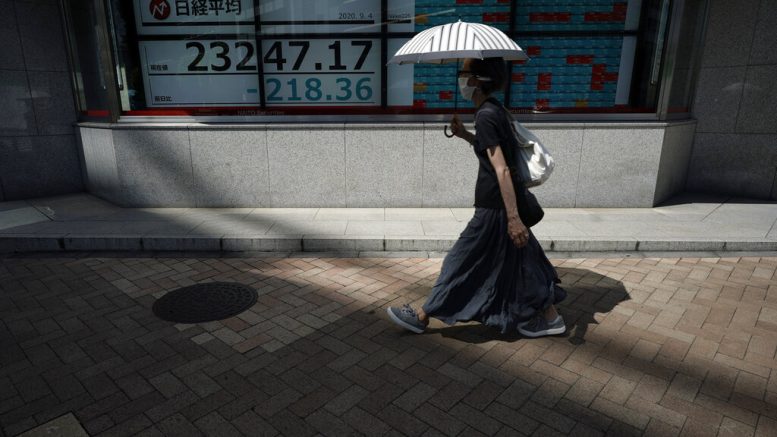Asian markets skidded Friday after Wall Street had its worst day since June, as investors’ exuberance faltered after a spate of record highs.
Shares fell across the region Friday, with Tokyo’s Nikkei 225 shedding 1.1%.
There was little going on regionally to alter the market’s trajectory after the U.S. benchmark S&P 500 gave up 3.5%, its biggest loss in three months, and the Nasdaq fell 5% as high-flying technology companies took a tumble after months of spectacular gains.
There seemed to be no explicit catalyst for the sell-off, with economic data coming in roughly where the market had expected and no companies issuing foreboding warnings. But the market felt due for a breather, analysts said.
There is still plenty of money sloshing through financial systems with the Federal Reserve and many other central banks unleashing massive amounts of cash through bond purchases, while keeping interest rates ultra low.
“While I don’t think its a healthy meltdown, getting rid of some of the short term speculator froth will offer up better levels for the Wall of Money to indulge as we know the Fed is not going anywhere soon,” Stephen Innes of AxiCorp said in a commentary.
The Nikkei 225 shed 255.04 points to 23,210.49 while the Hang Seng in Hong Kong lost 1.9% to 24,528.82. Australia’s S&P/ASX 200 gave up 2.6% to 5,952.70 and the Shanghai Composite index slipped 1.2% to 3,344.38.
Wall Street’s unloading of technology shares on Thursday ended with Apple plunging 8%. Amazon lost 4.6% and Facebook gave back 3.8%.
Investors have been betting those companies will keep making huge profits as people spend even more time online with their devices during the pandemic. They’ve also assigned lofty market values to new-found darlings such as Zoom Video Communications as many Americans work remotely and students do online learning.
Even with Thursday’s losses, Apple is still up 64.7% for the year, and Amazon is up 82.3%. Zoom’s gain for the year is still a whopping 460.4%.
”There’s really very little to justify (these stocks’ upward move) other than euphoria,” said Mark Hackett, chief of investment research at Nationwide.
The gains have been based on “very optimistic assumptions” about the virus’s impact on the economy, as well as on prospects for Congress and the White House coming up with another economic relief package.
The number of Americans who applied for unemployment benefits fell last week to 881,000, slightly better than what economists had expected, but companies are still letting workers go at numbers well above those seen in the Great Recession. So the jobs picture remains extremely bleak, with tens of millions of Americans still unemployed.
Investors will be paying close attention Friday when the Labor Department releases its August job report. Economists surveyed by FactSet forecast that the U.S. economy created 1.4 million jobs in August, down from 1.74 million jobs in July.
The Dow Jones Industrial Average fell 2.8%, to 28,292.73. A day earlier it crossed 29,000 for the first time since February.
The S&P 500 index lost 125.78 points to close at 3,455.06. The technology-heavy Nasdaq dropped 598.34 points to 11,458.10.
Semiconductor companies also fell sharply. Nvidia, Qorvo and Advanced Micro Devices fell 8% or more. Even with Thursday’s drop Nvidia is still the biggest gainer in the S&P 500 so far this year.
In energy trading, U.S. benchmark crude gave up 29 cents to $41,08 per barrel in electronic trading on the New York Mercantile Exchange. It lost 14 cents to $41.37 on Thursday. Brent crude, the international standard, declined 28 cents to $43.79 per barrel.
The dollar slipped to 106.16 Japanese yen from 106.18 yen late Thursday. The euro edged higher to $1.1854 from $1.1852.












































